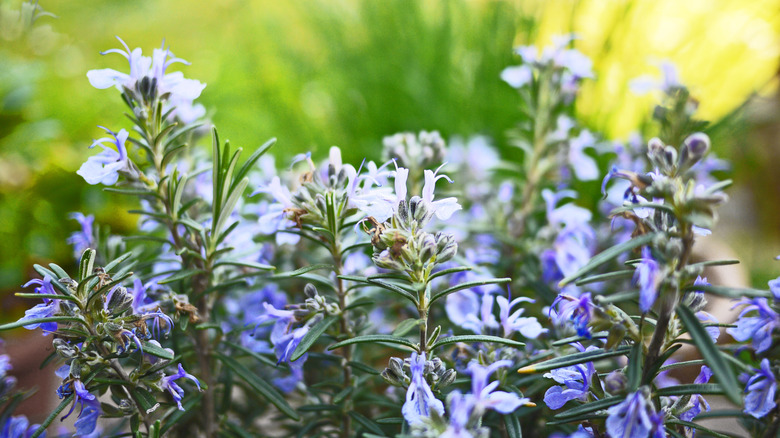Plant This Fragrant Herb Near Your Garden Gate To Keep Pests Away
Keeping the entrance to your garden free of pests can be as important as fertilizing your plants. No one will notice the beautiful flowers if they're busy fending off mosquitoes the second they walk through the gate. Protect the entrance of your yard by planting rosemary (Salvia rosmarinus) near your garden gate to keep the biting bugs away. While the fragrant and useful herb probably isn't as effective as chemical repellents like DEET, some studies show rosemary oils do repel the pests.
So, how does it work? The narrow, pin-like leaves of the rosemary plant contain natural oils burneol, linalool, geraniol, and sineol, which are traditionally used in some mosquito repellents. When researchers in Indonesia tested this, they had a volunteer put a concentrated rosemary oil on their arm before sticking it into a container with mosquitoes. They found the rosemary oil did repel mosquitoes for about four hours. That said, there's certainly a difference between concentrated rosemary oil and the rosemary plant, and there's no definitive evidence yet that the plant alone repels the disease-carrying insects.
You could always use rosemary at the gate in combination with other common deterrents, such as using the orange peel hack that could keep mosquitoes away from your yard. Pests aside, there are still many other amazing reasons to plant rosemary in your garden. It's a great herb to use to season chicken or potatoes in the kitchen. In the shower, rosemary oil can relieve dry, flaky skin on your scalp.
How to ensure rosemary thrives in your garden
If you opt to grow rosemary, it's truly best for USDA Hardiness Zones 9 through 10, as it's a tender perennial. If you plan to plant this outside by your garden gate, be sure you live in an area where winter temperatures rarely dip below 20 degrees. If you live in regions with colder winters, such as zones 1 through 5, you might want to consider planting rosemary in a pot to bring inside after the first freeze. The herb also hates being transplanted once snug in a flowerbed, so keep that in mind when deciding where to put it.
If you want to give rosemary a try, know that it grows best from stem cuttings, since the seeds are sometimes difficult to germinate. Rosemary loves full sun, though it'll tolerate a little shade in warmer or milder climates. It can handle a dip to either side of neutral for soil pH, preferring a pH between 5 and 8. With the right conditions and some expert tips, you can easily learn how to plant a rosemary hedge in your garden.
Different kinds of rosemary offer a variety of colored blooms. 'Tuscan Blue' rosemary (Salvia rosmarinus) is a popular variety with blue flowers, and R. officinalis 'Majorca Pink gives a pop of pretty pink blooms. Also, once you grow your rosemary, you can use the leaves to create rosemary oil, and then learn how to make your own rosemary insecticide.

